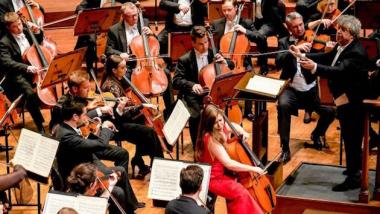
The venerable Czech Philharmonic came to Davies Symphony Hall again last night, with a simple program. In the splendid execution of the concert, however, the event became simply grand. Returning after successful appearances here in 2000 and 2003, the orchestra had its biggest night.
The “Česká filharmonie” started its life in 1896 as the Prague National Theater’s orchestra, playing for operas and operettas in the theater, often under the baton of Antonín Dvořák.

Fast-forward 122 years, and the Philharmonic arrives in San Francisco for a “simple” concert of nothing but Dvořák: his 1896 (yes, the same year as the orchestra’s birth) Cello Concerto in B minor, Op. 104 and 1885 Symphony No. 7 in D minor, Op. 70.
Not enough Dvořák? Responding to standing ovations, the Philharmonic’s new chief conductor, Semyon Bychkov, led the orchestra in encore performances of you-know-whose Slavonic Dances No. 2 and No. 1, in that order.

The glory of the cello concerto was the cellist: Alisa Weilerstein, with complete, unaffected mastery of the big score, beautiful legato “singing,” and a warm, passionate sound. Since her young-virtuoso days, she has dropped excessive theatrics, putting all emotions into the music — and what she now accomplishes is sensational.
The orchestra, especially “fellow-strings,” were right up with Weilerstein, and in the second movement, concertmaster Jiří Vodička played a brief but affecting duet with her. In the evening’s only possible criticism of Bychkov’s otherwise superb leadership, the orchestra’s fortissimo rejoinders at times nearly overwhelmed the cello, even in the quiet Adagio.
After the concerto, on her third return to the stage to acknowledge the huge applause, Weilerstein broke ranks with the all-Dvořák evening and played as encore a deeply spiritual rendition of Bach’s Sarabande from the Cello Suite No. 4.
Listening in Davies Hall to the Dvořák’s Seventh Symphony for the second time within four hours, and hearing it performed with the unsurpassable authenticity of the Czech orchestra — and conducted by Bychkov without a score — once again the strange contradiction arose: how the Romantic-era nationalist of Bohemia and Moravia could so completely meld with Brahms’s grand and lofty German sound.

Brahms had a major influence on Dvořák’s life, career, and composition, and the two had a close relationship based on mutual admiration, but perhaps it’s never more evident than in the Seventh Symphony, with Dvořák under the immediate impression of Brahms’s majestic Third.
In addition to the Philharmonic’s sensational string sections (violins and basses especially shining in the Allegro, cellos having their way in the Finale), woodwinds and brass here join in the grand oceanic sweeps of the music brilliantly. Many memorable orchestral solos included the horns (Jan Vobořil, principal) and oboes (Jana Brožková).
The lighter, playful music of the Slavonic Dances encores served both to remind of the composer’s homeland and to serve as transition for the audience to return to the less-beauteous reality outside Davies Hall.

